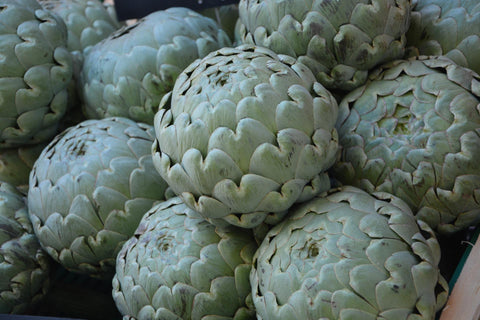How to Grow Artichokes from Seeds – A Complete Guide
Artichokes are an exotic vegetable that has been cultivated as a delicacy for centuries. Consumed as a gourmet food by ancient Romans and Greeks, artichokes have been used since in some of the finest world cuisines. With its strong earthy taste and immense health benefits such as Vitamin C, fiber, and iron, artichokes can be a great addition to grow in your garden.

Belonging to the thistle family, artichokes are mainly grown for their tender flowering buds. They can be easily grown and harvested from seeds either as perennial or annual vegetables depending on the climatic conditions.
How to Grow Artichokes from Seeds
Tick off your garden wish list by growing delicious artichokes from seeds right at home. All you need is quality seeds, fertile soil and a few care tips to grow this exceptional plant.
Get started by following the complete guide on how to grow artichokes from seeds.
Artichoke Seed Varieties to Grow

Some of the best artichoke seed varieties you can grow in your garden are as follows:
- Green Globe Artichoke Seeds: This is a common cool-weather artichoke that can be grown in hardy zones 7-10 regions.
- Purple Italian Globe Artichoke Seeds: This is a high-yielding artichoke variety, that’s hardy in zones 6 and beyond.
- White Mammoth Organic Sunchoke / Jerusalem artichoke: They are highly-nutritious bulbous tubers that grow best when planted early in the season.
Where to Plant Artichokes

Artichokes are easily adaptable plants, you can either grow them in containers or raised soil beds in your garden. The reason artichoke plants die even before developing buds is because of insufficient watering in the summer and waterlogged soil in the winter. Plant them in areas that receive full sun to partial shade with easy access to water and drainage.
When to Plant Artichokes
Artichokes grow best in medium summers and mild winters. For growing artichokes as annuals, plant them in late winter to leave plenty of time to develop buds by midsummer and fall. For growing artichokes as a perennial, sow them during late summers and early winters.
How to Plant Artichokes from Seeds

Are you ready to start planting your artichoke seeds? Learn how to effectively plant these herbaceous plants by following this simple guide.
- Start seeds indoors in seed starting trays, at least 6-8 weeks before the last spring frost date.
- Sow artichoke seeds ¼ inches deep and about 2-3 seeds per cell in the seed starting mix.
- For a faster germination process, soak the seeds overnight in warm water.
- Germination can take place between 10-14 days in temperatures ranging from 70-80 degrees.
- After 3-4 weeks, harden off the artichoke seedlings and transplant them to their final location.
Transplant Artichoke Seedlings
Artichoke seedlings can be either transplanted in raised beds or containers and pots. When transplanting the delicate seedlings, gently pull them from the seed starting trays after loosening the soil around them. Here’s how you can grow artichokes:
Grow Artichokes in Raised Beds

Transplant the young seedlings directly to the ground about 6 inches deep in rows with a space of 3-4 feet apart. Plant them when the temperatures are cool and frost-free in winters and mild and humid in summers. The average growing temperatures can be 50 degrees at night and 75 degrees during the day. You can also plant artichokes from dormant roots and shoots taken from mature plants.
Grow Artichokes in Containers

Artichokes are perfect plants for container gardening. They grow 3-4 feet in height and have a diameter of up to 6 feet, therefore, these plants need sufficient space to thrive. Transplant only one seedling per container which is at least 35-40 inches in size for healthy growth and harvest.
Artichoke Growing Tips
To harvest fresh tender artichokes from your garden, follow these simple growing tips.
- Artichokes are water-loving plants; they require a lot of watering and moist soil to develop firm buds.
- For best results grow artichokes in well-draining, fertile soil. Maintain a neutral soil pH (6.5 and 7.0).
- Use natural mulch or vegetable garden cover to retain moisture and ward off insects.
- Avoid mulching when they begin to bud, and instead use compost around the plants.
- For an extra boost, use balanced fertilizers.
- Full sun can aid in healthier and firm flowering buds.
- If pests and diseases such as aphids, flea beetles, powdery mildew, and bacterial crown rot are detected, use organic insecticides and sprays.
When to Harvest Artichokes

The ideal time to harvest artichokes is 80-100 days after transplanting. You can harvest them when the flowering buds emerge and are at their maximum size. The buds have to be swollen and the bracts shut tight for a successful harvest. If they are open, then you have missed your harvesting window. Use a sharp knife to cut the artichoke stem about 1-2 inches below the bud.
Now that you are ready to plant artichokes in your garden, get the best quality artichoke seeds at Seed World Marketplace today!
